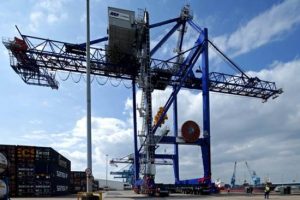Archives
Feature, Freight News, Sea
ABP to double Humber box handling despite Brexit
[ April 3, 2017 // Chris ]ABP is to invest £50 million to more than double the capacity of its two Humber container terminals. It has committed nearly £30 million to upgrading Hull Container Terminal including the purchase of four new Liebherr ship-to-shore cranes, two of which were delivered in 2016 with two more scheduled for delivery in 2018. Immingham Container Terminal, which also took delivery of a new Liebherr crane in 2016, will be further extended with major investment in new equipment and technology.
Capacity at the two ports will be more than doubled to allow them to handle around 550,000 boxes a year, as well as to improve quayside handling rates and reduce waiting times for hauliers.
ABP says there has been a 41% growth in volume at its Humber container terminals since 2013and it expects this trend to continue after Brexit.
This investment in the Humber comes on the back of the recent investment by ABP in Southampton of a further £50 million on a vehicle handling terminal which will predominantly be handling UK manufactured vehicles for export.
ABP Humber director Simon Bird, said: “We have seen significant growth at our Humber container terminals in recent years and all the indications are that this will continue despite Brexit. We anticipate growth in container shipping in the coming years and ABP in the Humber are keen to position ourselves to take advantage of that growth. This is a huge vote of confidence in the economy of the North of England at this crucial time.”
ABP’s four ports on the Humber (Grimsby, Goole, Immingham and Hull) make up around half of the company’s revenue and roughly around 13% of all of the UK’s seaborne trade. The Humber estuary is increasingly being promoted by business and politicians as the UK’s energy hub with significant growth in the renewables sector along the Humber being a major part of that role.
ABP adds that it is keeping an eye on the possibility of new free trade zones post-Brexit. “Brexit represents opportunities for port-based, export led manufacturing, particularly if the Government was able to introduce Free Trade Zones at ports,” says Mr Bird. “This would provide great opportunities for customers to reduce costs for inbound materials and also take advantage of spare capacity in containers, trucks and ships, to re-export.”
Tags: ABP












